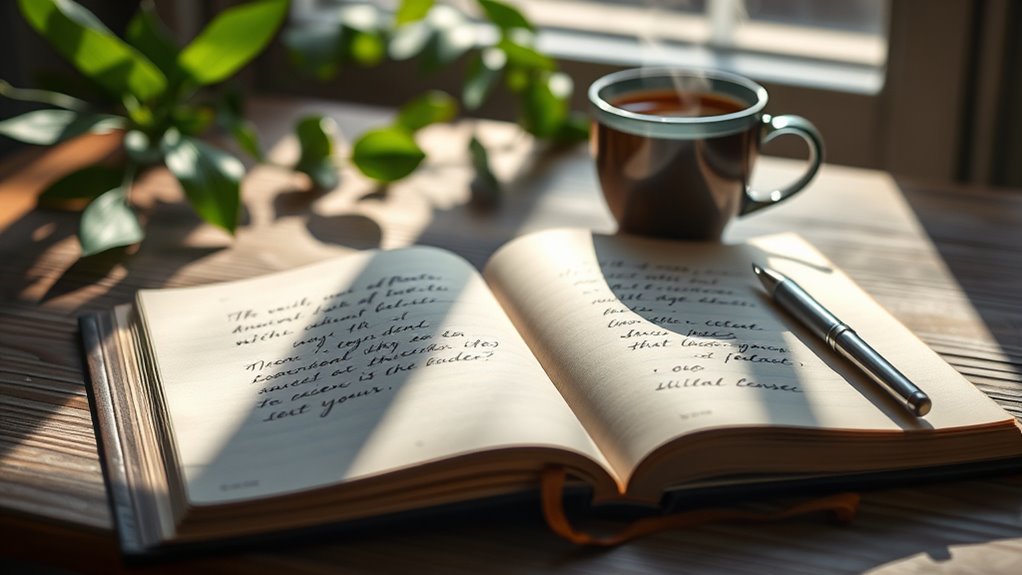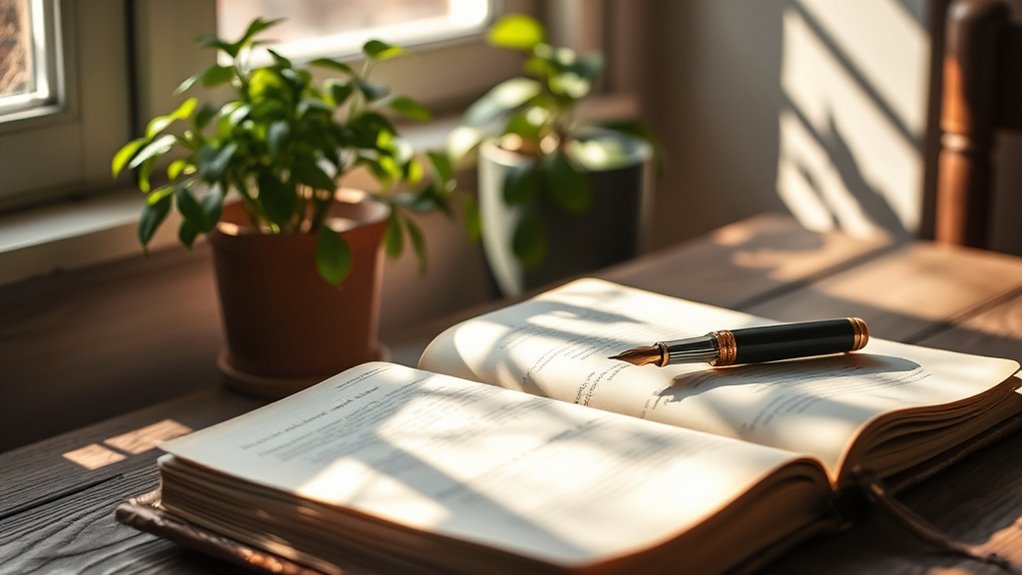Discovering powerful questions for self-reflection starts with fostering curiosity and using non-judgmental, open-ended prompts. Ask “Why” to explore motivations and beliefs, and “What” to clarify needs and values. Incorporate techniques like meditation and grounding exercises to deepen your insights. Regularly update your questions to stay relevant and aligned with your growth. By consistently engaging with meaningful questions, you’ll uncover new perspectives and continue expanding your self-awareness along your journey.
Key Takeaways
- Focus on open-ended, curiosity-driven questions like “What am I avoiding?” to deepen self-awareness.
- Incorporate “why” questions to explore underlying motivations and beliefs influencing behavior.
- Regularly update and personalize questions to align with evolving personal growth goals.
- Use mindfulness and visualization techniques alongside questions to enhance insight and emotional clarity.
- Create a collection of meaningful prompts rooted in gratitude, lessons learned, and emotional responses for ongoing reflection.
The Role of Curiosity in Self-Exploration

Have you ever noticed how curiosity fuels your desire to understand yourself more deeply? When you approach self-reflection with genuine curiosity, you open space for growth and insight. Instead of judging or analyzing, you gently explore your thoughts, feelings, and reactions, asking questions like “Why do I feel this way?” or “What’s beneath this emotion?” Curiosity keeps you engaged, encouraging patience and compassion. It transforms reflection into an active, compassionate inquiry rather than a critique. By staying curious, you create a safe space for honest exploration, allowing your true self to emerge naturally and fostering deeper understanding and connection with yourself. Recognizing the importance of diverse perspectives and genres can also enrich your self-awareness, as engaging with different viewpoints broadens your understanding of human experience. Embracing a variety of reflective techniques can further deepen your self-knowledge and uncover new facets of your personality. Incorporating continuous learning into your reflection process supports ongoing growth by exposing you to new ideas and insights. Additionally, cultivating a growth mindset supports ongoing self-discovery by encouraging openness to new insights and experiences.
Crafting Questions That Deepen Awareness

How can you craft questions that truly deepen your awareness? Start by focusing on openness and curiosity, asking questions that invite exploration rather than judgment. Use gentle, non-judgmental language and frame questions to uncover underlying feelings and beliefs. For example, ask “What am I avoiding?” or “Where does this feeling originate?” rather than seeking immediate answers. Be patient and allow your mind to wander naturally. Focus on present-moment sensations, thoughts, and insights. Incorporating neuroscience-backed techniques can further enhance your self-reflection process, encouraging a growth-oriented mindset that fosters ongoing personal development. Engaging in mindfulness practices such as meditation can help cultivate a deeper presence in the moment, allowing you to observe your thoughts and feelings with greater clarity. By framing questions that encourage curiosity and self-compassion, you create a safe space for deeper understanding and expanded awareness.
How “Why” and “What” Questions Differentiate Insights

Different types of questions open different pathways to understanding. “Why” questions tend to focus on uncovering causes and underlying motivations, prompting you to explore reasons behind events or feelings. They help you identify patterns, beliefs, or assumptions driving your behavior, and can reveal underlying causes that influence your actions. In contrast, “What” questions direct your focus to personal needs, values, or possibilities. They encourage reflection on what truly matters to you and what actions align with your authentic self. Recognizing these differences allows you to choose the right question for deeper insight, whether you’re seeking to understand root causes or clarify your needs and goals. Both question types enrich your self-awareness journey. Additionally, understanding the cultural intelligence components can help you evaluate what level of cultural awareness and adaptability is necessary for engaging successfully in diverse environments.
Using Meditation to Enhance Reflective Inquiry

Meditation serves as a powerful tool to deepen your reflective inquiry by cultivating a calm, centered mind. When you meditate, you create space for your thoughts, emotions, and sensations to surface without judgment. This heightened awareness allows you to observe your internal landscape with curiosity and compassion, enriching your self-inquiry. Regular practice helps you detach from reactions and biases, fostering clarity and insight. Incorporating meditation into your reflective process enables you to approach questions with patience and openness, making your insights more profound. Mindfulness practices can further deepen your capacity for self-awareness and insight. Additionally, utilizing acne patches as part of your skincare routine can boost your confidence and provide a tactile way to focus your attention during reflection. To optimize your reflective sessions, it’s helpful to be aware of support hours offered by entertainment and park venues, ensuring you plan your time effectively and avoid unnecessary stress. Engaging in vegetable juicing, such as preparing fresh aloe vera juice or ABC juice, can also support your mental clarity and overall well-being, enhancing your reflective practice.
Prompts for Grounding and Personal Growth

Ever wondered what prompts can help you stay grounded and foster personal growth? These questions anchor your awareness and encourage reflection. Consider asking yourself:
- What sensations do I notice right now?
- What am I grateful for in this moment?
- How does my body feel when I’m calm?
- What small action can I take today?
- What core value is guiding me now?
- How might engaging in remote hackathons expand my perspective and skills? Recognizing the importance of security vulnerabilities in new technologies can also inform how you approach challenges and risks. Developing well-being habits like mindfulness can further support resilience in daily life. Incorporating industry trends into your reflection can help you stay adaptable and open to growth.
These prompts keep you present and connected to your inner experience. They help you pause, observe, and realign with your authentic self. Incorporate them into daily reflection to nurture growth and resilience, creating space for deeper understanding and clarity.
Selecting Questions That Resonate Over Time

Choosing questions that resonate over time requires you to tune into what genuinely sparks curiosity and reflection within you. Focus on questions that evoke a sense of openness and deepen your understanding, rather than fleeting interests. Pay attention to which questions consistently inspire thought or bring new insights, as these are likely to remain meaningful. Trust your intuition to identify prompts that feel relevant across different moments. Remember, there are no fixed rules—what matters most is how a question encourages ongoing self-awareness and growth. Regularly revisiting self-reflective practices can help you recognize which questions continue to foster insight and connection. Cultivating awareness of your inner landscape allows you to notice which prompts truly resonate, helping you develop a more authentic and enriching self-reflection process. Additionally, being mindful of expiration of ideas can ensure that your questions stay relevant and impactful over time. Integrating personal growth techniques such as visualization and affirmations can also enhance the effectiveness of your reflective questions. Over time, these resonant questions become trusted guides, helping you explore your evolving inner landscape with clarity and compassion.
Integrating Reflective Questions Into Daily Practice

Integrating reflective questions into your daily routine transforms self-awareness from a sporadic practice into a consistent habit. To do this, set aside a specific time each day—morning, lunch, or evening—to pause and reflect. Keep a journal or digital note handy to jot down insights. Use simple prompts like:
- What am I grateful for today?
- What did I learn about myself?
- How did I handle challenges?
- What feelings arose?
- What can I do differently tomorrow?
Focusing on emotional well-being can enhance the effectiveness of your reflection practice. Additionally, understanding your personality traits can provide deeper insights into your responses and growth opportunities.
Frequently Asked Questions
How Can I Overcome Fear of Honest Self-Examination?
You can overcome fear of honest self-examination by approaching it with curiosity and compassion. Instead of judging yourself, view it as a gentle exploration, like talking to a caring friend. Start small, focus on your feelings without avoiding them, and accept that discomfort is part of growth. Practice patience and remind yourself that being honest helps you understand and connect with your true self, leading to greater freedom.
What if I Struggle to Find Meaningful Answers?
When you struggle to find meaningful answers, you can slow down, pause, and observe. You can approach your questions with curiosity, patience, and compassion. You can embrace the process, trust that clarity unfolds gradually, and welcome whatever arises without judgment. You can stay present, remain open to new insights, and gently explore deeper layers. You can remind yourself that meaningful answers often come through persistence, kindness, and a willingness to listen inward.
How Do I Stay Patient During Deep Self-Reflection?
Staying patient during deep self-reflection can be challenging, but you can cultivate it by accepting that insights take time to emerge. Focus on being present with your experience without rushing for answers. Practice gentle curiosity and remind yourself that growth isn’t immediate. Take breaks when needed and trust the process. Over time, patience becomes natural, allowing you to explore your inner world more fully and compassionately.
Can Reflective Questions Help Resolve Longstanding Emotional Issues?
Like a gentle river carving through stone, reflective questions can help you resolve longstanding emotional issues. By exploring your thoughts and feelings with curiosity and compassion, you gain clarity and understanding. These questions invite you to identify root causes, challenge limiting beliefs, and uncover hidden patterns. Over time, this process fosters healing and emotional freedom, helping you move forward with greater self-awareness and resilience.
How Often Should I Engage in Mindful Self-Reflection Practices?
You should engage in mindful self-reflection regularly, ideally daily or several times a week. Consistency helps you stay connected to your thoughts and feelings, fostering greater awareness and growth. When you make it a habit, you become more attuned to your needs, reactions, and underlying patterns. Remember, there’s no perfect frequency—listen to yourself and reflect when you feel the need or want to deepen your understanding.
Conclusion
As you explore these questions, you might notice unexpected insights emerging—like a forgotten memory or a new perspective quietly revealing itself. Sometimes, the most profound discoveries happen when you least expect them, almost by coincidence. Keep curiosity alive, and trust that the answers you seek are already within you, waiting to unfold. Embrace each reflection as a gentle nudge toward greater clarity, reminding you that your journey of self-discovery is always unfolding in surprising ways.









